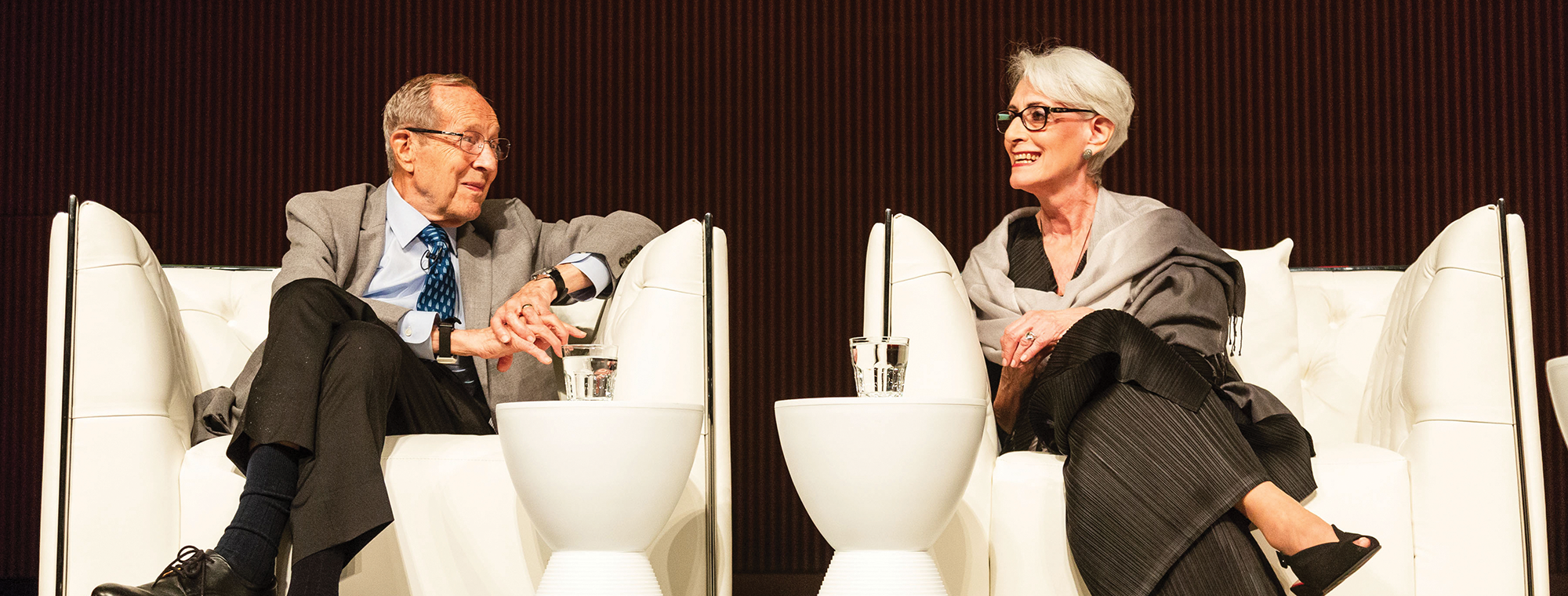By Ambassador Wendy R. Sherman
In diplomacy, and in life, we always have to be prepared to accept our lack of control over circumstances. The world can and often will wreak havoc on our plans.
Even these days, when I am often despairing and want to lean out, I keep working to make the world safer, less violent and more understanding, because I still carry my parents’ faith that the world can change for the better if you have the courage to keep trying.
If the pain of letting a deal get away is proportional to how close you get to completing it, one of the hardest failures I’ve ever had to accept is the long-range missile test moratorium with North Korea that almost became my last deal as a Clinton administration official.
I had been negotiating with the North Koreans since 1997, after it became clear that they were not only testing missiles for their own program but had been shipping missiles and related technology to Iran. The White House responded by slapping sanctions on the North Koreans to get their attention.
The next year, as the relationship continued to degrade, and missile tests went on unabated, the president asked his former defense secretary, Bill Perry, to make a full review of our relationship with the Kim regime and its nuclear ambitions. Bill brought along his academic partner Ashton Carter, who later became President Obama’s secretary of defense, and borrowed me as the inside-government person to join his review team.
Diplomatic relations with the Democratic People’s Republic of Korea, or DPRK, as the government is formally known, are a little like the movie Groundhog Day — time seems to be caught in a loop as the same events repeat over and over.
Then, as now, the United States had imposed sanctions to kick-start negotiations after the DPRK launched a missile that flew over Japan. In May 1999, Bill and I traveled to Pyongyang with our small team to meet with senior North Korean officials and deliver a letter from President Clinton offering to back off on sanctions and normalize our relations in return if North Korea would agree to abandon its nuclear weapons program and stop developing long-range missiles.
Dealing with North Korea always involves one part normal, if tortuous, diplomacy and one-part absurdity. On my first trip to the country with the Perry team, we joined an entourage of North Korean officials on a visit to a rice paddy. Farmers and oxen were working together in a swampy field festooned along one side with signs bearing revolutionary slogans. On the other side of the field was a military band whose members were dressed in pristine white band uniforms, playing revolutionary anthems. It was a surreal scene, one that might have taken place 100 years ago, in the country’s colonial past.
It’s important to realize that the Kim regime’s actions are not the result of irrationality. The bizarre moments, like our visit to the rice paddy, are less the product of a loose screw than of overexuberant socialist propaganda. Similarly, their taunting and illicit missile tests act out a strategy that has proved effective. If the DPRK’s behavior under Kim Jong Il tested the world’s patience, it was because he, like his father, and as his son does now, acted according to a paradigm rooted in the idea that the United States is determined to destroy the regime. In his mind, the only way he could guarantee its survival was to have nuclear weapons to deter us from attacking. If you understood his perspective, his behavior was rational.
Indeed, the “Dear Leader” was smart and transactional. He and his top advisers knew precisely what they wanted. At the time I negotiated with them, 14 extremely technical issues were up for discussion. When Secretary Albright, along with me and our team, made the historic October 2000 trip to Pyongyang, Kim Jong Il sat with an interpreter and Kang Suk Ju, my counterpart, and went through each of the points of concern with surprising mastery, answering authoritatively and ignoring only those points on which he didn’t hold a strong position.
In a highly technical negotiation, the details are critical. If the leader knows what is being negotiated, it’s a good indication that a deal can be made. (Which makes me greatly concerned about how such negotiations will fare under our current president.)
I believe that Kim Jong Il was ready in 2000 to complete a deal over his missile program. Unfortunately, my country was not ready.
The negotiations continued, and we looked to be very close to a deal. The American media, sensing the breakthrough, kept a constant watch on whether I would return to North Korea, pestering me so often that at a good-bye reception at the State Department for diplomatic press as the Clinton administration wound down, I sported a sign, tied with ribbon from my neck, reading No Decision Yet to fend off the repeated inquiries.
I never went to Pyongyang again. Between the president’s Middle East negotiations and the uncertainty over the outcome of the presidential election, we simply ran out of time.
The world can and often will wreak havoc on our plans. In addition to the disappointment of the election, I had to process the disheartening realization that my team and I might have wrestled a viable deal out of a tyrannical regime, only to have it negated by a Supreme Court ruling on a ballot recount in Florida.
The key to surviving tough times like these is to step back and look at the larger picture. Take stock of what you may have gained, despite seeming failure. Consider how you might use that knowledge, process and techniques to offer someone else support, or nurse yourself through. Whether it’s a policy setback or a professional disappointment, letting go can represent a leap forward.
One of my greatest moments of professional pride was when I became the first woman undersecretary for political affairs. But perhaps my biggest moment of disappointment in my professional career came from wanting to be the first woman deputy secretary of state. In the spring of 2014, Bill Burns, the deputy secretary and my predecessor as undersecretary for political affairs announced that he planned to retire from the Foreign Service in the fall, after an extraordinary career of more than 30 years. The buzz began immediately about possible candidates to follow in his footsteps. I wanted to be respectful of the president’s and Secretary Kerry’s selection process while at the same time ensuring I was given real consideration. I carefully let Kerry’s chief of staff know of my interest. I heard that others, particularly other senior women in the department, were urging the secretary to recommend me to the president. Finally, after many weeks of uncertainty, Secretary Kerry and I had a conversation, and he told me he was recommending me.
As we neared the end of Bill’s time without a decision announced, National Security Adviser Susan Rice suggested that some influential men in the White House were supporting Tony Blinken, a colleague with whom I’d worked well since the Clinton years, a longtime aide to Vice President Biden, and now Susan’s very competent deputy and someone who had been with President Obama since the beginning.
On a Friday, the eve of Yom Kippur, the holiest day in the Jewish calendar, Secretary Kerry called me to his office. The president, he informed me, had decided on Tony.
When I got back to work Monday, I asked Secretary Kerry if he would recommend to the president naming me acting deputy until Tony was confirmed by the Senate. The president and secretary agreed (meaning that, officially, I was the first female to sit in the chair, even if I wasn’t to be permanently appointed).
Part of letting go of the disappointment of not becoming deputy secretary of state was accepting what I got instead: had I replaced Bill as deputy then, I probably would not have continued to lead the work on the Iran deal, one of the singular accomplishments of my time at State, and a signature achievement of the Obama era.
Of course, that achievement proved short-lived. In May 2018, President Trump withdrew the United States from the nuclear agreement, although Iran was — and still is — in compliance, and reimposed unilateral sanctions on nations that continue to do business with Iran.
Despite this, our European allies remain committed to the Iran deal. Unfortunately, I think it will be very hard to keep this agreement alive. It is very painful for me to say that, given my role. Our secondary economic sanctions will basically mean that anyone who does business with the Central Bank of Iran cannot do business with American banks, which is the simple version of the situation. All the big companies have left Iran because they care more about the US market than the Iranian market, and US banks more than the Iranian Central Bank. Over the long haul, we are playing into the hands of Russia and China and putting our allies — the Europeans — in league with Russia and China against the United States. It is a truly bizarre and more than unfortunate circumstance in which we find ourselves. We are back potentially to the brink of an Arab-Persian war.
But, I recall that at a dark moment in the Iran negotiation, when failure seemed certain, John Kerry said, “Sometimes you have to meet and not get anywhere in order to one day get somewhere.” I don’t mean to say that letting go always means taking it on the chin. But the tendency to try to control one’s life too closely can inhibit us from saying yes to opportunities that might change our lives. So, during these moments when it feels hopeless, I go back to what I know: we must learn from our experiences and use that knowledge as inspiration as we get up and try again.
Indeed, the day after President Trump’s inauguration, millions of women marched in streets all over the country and all over the world. That march produced scores of women who have since been moved to run for office. It’s inevitable that many will fail in their first try. But it’s exhilarating to know that even after what we’ve been through, so many want to give it a try. People have taken failure and turned it into personal and political power.
We may not succeed at first. But abetting the failure of our democracy is not an option. We will mourn our loss together and then, together, we will try and try again.
Ambassador Wendy R. Sherman was the Under Secretary of State for Political Affairs who led the US negotiating team that reached agreement in 2015 on a Joint Comprehensive Plan of Action between the P5+1, the European Union and Iran for which she was awarded the National Security Medal by President Barack Obama. Before this she served as Counselor of the Department of State under Secretary Madeleine Albright, Special Advisor to President Clinton and Policy Coordinator on North Korea as well as on the US Department of Defense’s Defense Policy Board and Congressional Commission on the Prevention of Weapons of Mass Destruction, Proliferation and Terrorism. She is currently senior advisor at Albright Stonebridge Group and as of January 2019, Ambassador Sherman joined Harvard Kennedy School as a professor of the practice in public leadership and Director of the School’s Center for Public Leadership. Excerpted from Not for the Faint of Heart: Lessons in Courage, Power, and Persistence by Ambassador Wendy R. Sherman. Copyright © 2018. Available from PublicAffairs Books, an imprint of Perseus Books, LLC, a subsidiary of Hachette Book Group, Inc.
This article is part of our new report, "A New Vision: Gender. Justice. National Security." See all the articles from our report here.
Photo: Former Secretary of Defense William J. Perry and Ambassador Wendy R. Sherman at the 2018 Ploughshares Fund gala
Read @wendyrsherman. Never give up. #Democracy #NewVision2019.




